In the tapestry of global leadership, a select few individuals emerge as beacons of inspiration, vision, and influence, shaping the course of nations and the trajectory of humanity. These extraordinary leaders, through their unwavering commitment to progress, innovation, and diplomacy, stand at the forefront of history, guiding their countries and the world towards a brighter future. From heads of state to business moguls, philanthropists to activists, the top 10 leaders in the world embody diverse backgrounds, ideologies, and aspirations, yet share a common dedication to catalyzing positive change on a global scale. As we navigate the complexities of the contemporary world, exploring the stories and legacies of these eminent figures offers profound insights into the transformative power of leadership and the boundless potential of human endeavor. Here is the list of top 10 leaders in the world.
Table of Contents
1. Xi Jinping
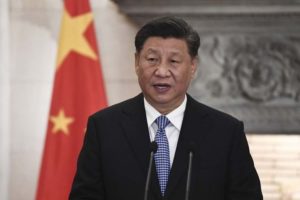
Xi Jinping, the paramount leader of China, commands significant influence both domestically and internationally. Born in 1953 to revolutionary parents, Xi grew up immersed in China’s political landscape, eventually ascending to the pinnacle of power within the Chinese Communist Party (CCP). He assumed the presidency of China in 2013, succeeding Hu Jintao, and concurrently became the General Secretary of the CCP and Chairman of the Central Military Commission.
Xi Jinping’s leadership is characterized by a blend of political astuteness, nationalism, and pragmatism. Domestically, he has spearheaded far-reaching initiatives such as the “Chinese Dream,” which emphasizes national rejuvenation, economic prosperity, and social stability. His tenure has seen ambitious reforms aimed at restructuring the economy, combating corruption, and enhancing social welfare programs.
One of Xi’s hallmark policies is the Belt and Road Initiative (BRI), a vast infrastructure and economic development project designed to enhance China’s global influence through investments in infrastructure across Asia, Africa, and Europe. While heralded as a transformative vision for global connectivity, the BRI has also faced criticism for its debt-trap diplomacy and lack of transparency.
Xi Jinping’s leadership style is marked by a consolidation of power, with his ideology, “Xi Jinping Thought on Socialism with Chinese Characteristics for a New Era,” enshrined in the CCP constitution. He has overseen a crackdown on dissent, tightening controls over media, civil society, and the internet, while also emphasizing ideological purity within the party ranks.
On the international stage, Xi Jinping has positioned China as a champion of globalization and multilateralism, advocating for a more prominent role for emerging economies in global governance. However, China’s assertive stance in territorial disputes in the South China Sea, its treatment of ethnic minorities in Xinjiang, and its growing military assertiveness have sparked tensions with neighboring countries and drawn scrutiny from the international community.
Xi Jinping’s leadership represents a complex blend of political ambition, nationalism, and pragmatism. While he has overseen remarkable economic growth and consolidation of power, his tenure has also raised concerns about human rights, political freedoms, and China’s growing assertiveness on the world stage. As China continues to rise as a global power, Xi Jinping’s leadership will undoubtedly shape the course of 21st century geopolitics.
2. Vladimir Putin
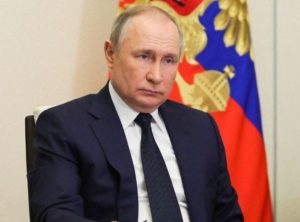
Vladimir Putin, the President of Russia, is one of the most influential and enigmatic figures in contemporary global politics. Born in 1952 in Leningrad (now St. Petersburg), Putin rose through the ranks of the Soviet-era KGB before entering politics in the tumultuous years following the collapse of the Soviet Union. He served as Prime Minister under President Boris Yeltsin before assuming the presidency in 2000, a position he has held, with some intervals, for over two decades.
Putin’s leadership style is characterized by a blend of assertiveness, pragmatism, and a strong sense of Russian nationalism. Under his tenure, Russia has experienced significant political consolidation and economic stabilization, following the turbulent years of the 1990s. Putin’s leadership has focused on restoring Russia’s status as a major global power and safeguarding its strategic interests, both domestically and internationally.
Domestically, Putin’s government has centralized power, marginalized political opposition, and tightened control over media and civil society. Critics accuse his administration of suppressing dissent and curtailing political freedoms, while supporters argue that stability and order have been restored after the chaos of the post-Soviet era. Putin’s popularity remains high among many Russians, buoyed by his image as a strong and decisive leader who defends Russian sovereignty and national interests.
Internationally, Putin has pursued a foreign policy agenda aimed at reasserting Russia’s influence on the global stage. He has sought to counter what he perceives as Western encroachment on Russia’s sphere of influence, particularly in former Soviet republics. This has manifested in interventions in Ukraine, Georgia, and Syria, as well as assertive actions in cyberspace and information warfare.
Putin’s leadership has also been marked by a complex relationship with the West. Tensions have escalated over issues such as NATO expansion, missile defense systems, and accusations of Russian interference in Western elections. Despite these challenges, Putin has shown a willingness to engage in diplomacy when it serves Russia’s interests, as seen in negotiations over arms control, energy cooperation, and international crises.
In summary, Vladimir Putin’s leadership has shaped Russia’s trajectory in the 21st century, leaving a lasting impact on domestic politics, regional dynamics, and global geopolitics. As he continues to navigate complex challenges at home and abroad, Putin’s legacy remains deeply intertwined with Russia’s quest for stability, security, and influence in an increasingly uncertain world.
3.Donald Trump
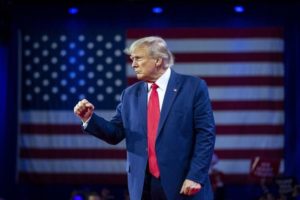
Donald Trump, the 45th President of the United States, is a figure who has left an indelible mark on American politics and global affairs. Born in 1946 in Queens, New York, Trump first gained national prominence as a real estate mogul and reality television personality before entering the political arena.
Trump’s presidency, which began in January 2017, was marked by a combative and unconventional style that challenged traditional norms and conventions. His populist rhetoric, brash demeanor, and “America First” agenda resonated with many disillusioned voters who felt left behind by the political establishment.
During his tenure, Trump pursued an ambitious domestic agenda that included tax cuts, deregulation, and efforts to roll back key elements of the Affordable Care Act. He appointed conservative judges to federal courts, including three justices to the Supreme Court, reshaping the judiciary for years to come.
One of Trump’s signature policy initiatives was his stance on immigration, particularly his controversial proposal to build a wall along the U.S.-Mexico border to curb illegal immigration. His administration implemented a series of stringent immigration policies, including travel bans targeting predominantly Muslim countries and the separation of migrant families at the border, which drew widespread condemnation.
Trump’s approach to foreign policy was characterized by a mix of isolationism, protectionism, and transactional diplomacy. He pursued a hardline stance on trade, imposing tariffs on China and other trading partners in an effort to address what he viewed as unfair trade practices. His administration also withdrew from international agreements and organizations, including the Paris Climate Accord and the Iran nuclear deal, while seeking to renegotiate existing treaties and alliances.
Throughout his presidency, Trump’s leadership style and policies sparked intense polarization and controversy, both domestically and internationally. His administration weathered numerous scandals, investigations, and impeachment proceedings, including allegations of collusion with Russia during the 2016 election and efforts to obstruct justice.
Despite facing significant opposition and criticism, Trump maintained a loyal base of supporters who embraced his outsider persona and populist message. His unorthodox approach to governance challenged conventional wisdom and upended the political establishment, leaving a lasting impact on American politics and reshaping the trajectory of the Republican Party.
In January 2021, Trump became the first U.S. president in history to be impeached twice by the House of Representatives, this time on charges of incitement of insurrection following the storming of the U.S. Capitol by a mob of his supporters. He left office in January 2021 after losing the 2020 presidential election to Joe Biden, although he continues to exert influence within the Republican Party and remains a divisive figure in American politics.
4. David Cameron
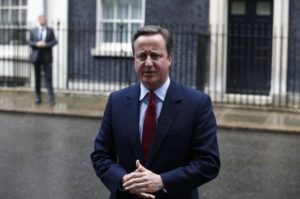
David Cameron, a prominent British politician, served as the Prime Minister of the United Kingdom from 2010 to 2016. Born in 1966 to a well-to-do family, Cameron was educated at Eton College and Oxford University before embarking on a career in politics.
Cameron’s rise within the Conservative Party was swift. Elected as Member of Parliament for Watney in 2001, he quickly ascended through the ranks, becoming leader of the Conservative Party in 2005. His leadership marked a shift towards a more centrist, modernizing agenda, as he sought to detoxify the party’s image and broaden its appeal to a wider electorate.
Cameron’s premiership was defined by a series of significant political and policy challenges. Upon assuming office in 2010, he led a coalition government with the Liberal Democrats in the wake of the global financial crisis. His administration implemented austerity measures aimed at reducing the budget deficit and restoring fiscal stability, while also pursuing structural reforms to the welfare state and public services.
One of Cameron’s most notable achievements was overseeing the successful referendum campaign to keep Scotland within the United Kingdom in 2014, which saw the Scottish electorate vote against independence. However, Cameron’s political legacy will forever be tied to his decision to hold a referendum on Britain’s membership in the European Union.
In 2016, Cameron called for a referendum on EU membership, fulfilling a campaign promise and seeking to settle the long-standing debate over Britain’s relationship with the EU. Despite advocating for the Remain side, Cameron ultimately found himself on the losing end of the referendum, as a majority of British voters opted to leave the EU.
The outcome of the referendum, commonly known as Brexit, had profound implications for British politics and the European Union. In the wake of the vote, Cameron announced his resignation as Prime Minister, paving the way for Theresa May to succeed him.
Cameron’s tenure as Prime Minister was marked by a mix of achievements and challenges. While he presided over a period of economic recovery and social change, his handling of issues such as austerity, immigration, and the EU referendum remains a subject of debate and scrutiny. Since leaving office, Cameron has largely withdrawn from frontline politics, though his role in shaping Britain’s future relationship with Europe will continue to be analyzed and debated for years to come
5. Manuel Valls
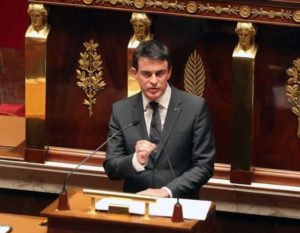
Manuel Valls, a prominent French politician, has played significant roles in both national and local politics. Born in Barcelona, Spain, in 1962, Valls moved to France as a teenager and eventually became a French citizen. He rose to prominence as a member of the Socialist Party and served in various ministerial positions before assuming the role of Prime Minister from 2014 to 2016 under President François Hollande’s administration.
Valls’ political career was characterized by a commitment to reform and modernization within the Socialist Party. As Minister of the Interior from 2012 to 2014, he gained recognition for his tough stance on crime and immigration, advocating for stricter security measures in response to terrorist threats and social unrest.
During his tenure as Prime Minister, Valls faced formidable challenges, including high unemployment, economic stagnation, and security concerns following a series of terrorist attacks in France. He pursued a reform agenda aimed at revitalizing the economy, reducing public spending, and promoting social cohesion. His government implemented labor market reforms and austerity measures in an effort to stimulate growth and reduce the budget deficit.
Valls’ leadership style was marked by pragmatism and a willingness to confront vested interests within his own party. He faced opposition from left-wing factions within the Socialist Party, who criticized his centrist policies and perceived abandonment of socialist principles. Despite internal dissent, Valls remained committed to advancing his vision of a more dynamic and inclusive France.
In 2016, Valls resigned as Prime Minister to pursue his candidacy for the presidency in the 2017 elections. Running as a centrist candidate, he positioned himself as a pragmatic reformer capable of bridging ideological divides and addressing France’s pressing challenges. However, his candidacy ultimately faltered in the face of stiff competition from other candidates, including Emmanuel Macron and Marine Le Pen.
Following his defeat in the presidential election, Valls continued to be active in French politics, serving as a member of the National Assembly and Mayor of Évry, a suburb of Paris. He also made unsuccessful bids for the mayor ship of Barcelona, his birth city, in 2019.
Manuel Valls remains a prominent figure in French politics, known for his advocacy of progressive policies and his efforts to modernize the Socialist Party. Despite facing setbacks and challenges throughout his career, Valls’ commitment to reform and his vision of a more dynamic and inclusive France continue to shape the political landscape in France and beyond.
6. Narendra Modi
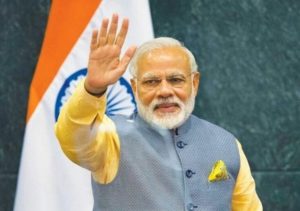
Narendra Modi, the Prime Minister of India since May 2014, is one of the most influential and polarizing figures in Indian politics. Born in 1950 in Vadnagar, Gujarat, Modi rose through the ranks of the Rashtriya Swayamsevak Sangh (RSS), a Hindu nationalist organization, before joining the Bharatiya Janata Party (BJP) in the 1980s.
Modi’s political career gained momentum when he became the Chief Minister of Gujarat in 2001. His tenure in Gujarat was marked by economic development and infrastructure growth, but also by controversy, particularly surrounding the 2002 Gujarat riots, which resulted in significant loss of life, particularly among the Muslim community.
As Prime Minister, Modi has pursued an ambitious agenda centered around economic reform, social change, and national security. His flagship initiatives include “Make in India,” which aims to boost manufacturing and job creation, and “Digital India,” which seeks to modernize India’s digital infrastructure and expand internet access.
Modi’s government has also implemented significant policy changes, including the introduction of a nationwide goods and services tax (GST) aimed at streamlining the country’s tax system, and the demonetization of high-value currency notes in 2016, intended to curb corruption and illicit wealth.
Modi’s leadership style is characterized by charisma, strong communication skills, and a focus on nationalist rhetoric. He has positioned himself as a decisive leader capable of addressing the country’s most pressing challenges, including poverty, corruption, and security threats.
However, Modi’s tenure has also been marked by criticism and controversy. Critics accuse him of centralizing power, undermining democratic institutions, and promoting a divisive agenda that marginalizes religious and ethnic minorities. His government has faced scrutiny for its handling of issues such as religious intolerance, freedom of speech, and human rights violations in conflict areas such as Kashmir.
Internationally, Modi has sought to enhance India’s standing on the global stage through increased engagement with major powers and participation in international forums. He has prioritized economic diplomacy, forging closer ties with countries such as the United States, Israel, and Japan, while also seeking to strengthen regional partnerships through initiatives such as the “Act East” policy.
In summary, Narendra Modi’s leadership has had a profound impact on India’s political landscape and its place in the world. While he has been credited with driving economic growth and implementing bold reforms, his government’s policies and actions have also sparked intense debate and raised concerns about the future of democracy and pluralism in India. As Modi continues to navigate the complexities of governance and leadership, his legacy will be shaped by his ability to address the aspirations and challenges of India’s diverse population while upholding the country’s democratic values and principles.
7. Angela Merkel
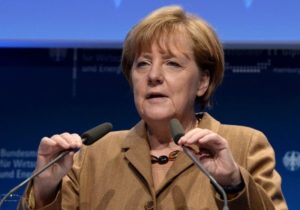
Angela Merkel, a towering figure in global politics, served as the Chancellor of Germany from 2005 to 2021, making her one of the longest-serving leaders in modern European history. Born in Hamburg, West Germany, in 1954, Merkel grew up in East Germany before the fall of the Berlin Wall and the reunification of Germany in 1990. Trained as a physicist, she entered politics after the collapse of the communist regime in East Germany.
Merkel’s rise to power within the Christian Democratic Union (CDU), Germany’s largest conservative party, was swift. She became the party’s leader in 2000 and, in 2005, made history as the first woman to serve as Chancellor of Germany.
Merkel’s leadership style is characterized by pragmatism, caution, and a commitment to consensus-building. Throughout her tenure, she navigated Germany through numerous domestic and international crises, including the global financial crisis of 2008, the European debt crisis, and the influx of refugees in 2015.
One of Merkel’s most significant achievements was her stewardship of the European Union during a period of profound uncertainty and upheaval. She played a central role in negotiating key agreements to address the eurozone crisis, strengthen fiscal discipline, and manage migration flows within the EU.
Domestically, Merkel’s leadership was marked by stability and economic prosperity. Under her tenure, Germany weathered the global economic downturn, maintained low unemployment rates, and experienced robust economic growth. Her government implemented structural reforms aimed at modernizing the German economy and promoting innovation and competitiveness.
Merkel’s leadership was not without controversy, however. Her decision to allow over a million refugees and migrants into Germany in 2015, amid the Syrian civil war and other conflicts in the Middle East and North Africa, polarised public opinion and strained Germany’s social cohesion. Critics accused Merkel of underestimating the challenges of integration and exacerbating tensions within German society.
In 2021, Merkel announced that she would not seek re-election, marking the end of an era in German politics. Throughout her tenure, she remained a symbol of stability and continuity in an increasingly uncertain world. Her departure from the political stage leaves behind a legacy of pragmatic leadership, consensus politics, and unwavering commitment to European unity and cooperation. As Germany and the European Union face new challenges in the years ahead, Merkel’s influence and legacy will continue to resonate, shaping the future of German and European politics for generations to come.
8. Hillary Clinton
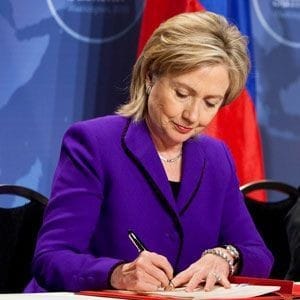
Hillary Clinton, a prominent figure in American politics, has had a multifaceted career spanning politics, law, and activism. Born in 1947 in Chicago, Illinois, Clinton rose to national prominence as First Lady of the United States during her husband Bill Clinton’s presidency from 1993 to 2001. As First Lady, she played an active role in policy initiatives, notably leading the Task Force on National Health Care Reform.
Clinton’s own political career began in earnest when she was elected as the first female Senator from New York in 2000, serving two terms until 2009. During her tenure in the Senate, she championed issues such as healthcare reform, women’s rights, and national security.
In 2008, Clinton launched her historic bid for the Democratic nomination for President of the United States, becoming the first woman to seek the presidency as a major party nominee. Though she ultimately lost the nomination to Barack Obama, she played a pivotal role in shaping the Democratic platform and energizing a diverse coalition of supporters.
Following her tenure as Secretary of State from 2009 to 2013 in the Obama administration, where she focused on advancing diplomacy and American interests abroad, Clinton once again sought the Democratic nomination for president in 2016. Despite winning the popular vote, she ultimately lost the election to Donald Trump in a hotly contested race.
Clinton’s political legacy is complex and multifaceted. As a pioneering figure in American politics, she has shattered numerous glass ceilings and inspired countless women and girls to pursue careers in public service. Throughout her career, she has been a fierce advocate for progressive causes, including healthcare reform, women’s rights, and education.
However, Clinton has also faced criticism and controversy, particularly surrounding her use of a private email server during her time as Secretary of State, which became a central issue during the 2016 presidential campaign. The FBI’s investigation into her email practices and allegations of Russian interference in the election have cast a shadow over her political legacy.
Despite these challenges, Clinton remains a prominent voice in American politics and a leading figure within the Democratic Party. Through her advocacy, activism, and philanthropy, she continues to champion causes she believes in and remains committed to advancing the values of democracy, equality, and justice both at home and abroad. As one of the most influential and polarizing figures in modern American history, Hillary Clinton’s impact on the political landscape is undeniable, and her legacy will continue to be debated and scrutinized for years to come.
9. Dilma Rousseff
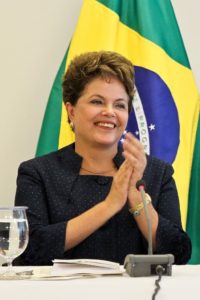
Dilma Rousseff, a significant figure in Brazilian politics, served as the 36th President of Brazil from 2011 to 2016, making history as the first woman to hold the office in the country’s history. Born in 1947 in Belo Horizonte, Brazil, Rousseff emerged as a key figure in the Workers’ Party (Partido dos Trabalhadores, PT), a left-wing political party founded by former President Luiz Inácio Lula da Silva.
Rousseff’s political career began in the 1960s when she became involved in left-wing activism during Brazil’s military dictatorship. She was subsequently imprisoned and tortured for her involvement in militant activities against the regime. Rousseff’s commitment to social justice and human rights shaped her political worldview and propelled her rise within the ranks of the Workers’ Party.
Before assuming the presidency, Rousseff held various ministerial positions, including Minister of Mines and Energy and Chief of Staff to President Lula da Silva. In 2010, she successfully ran for the presidency, riding on the popularity of the Workers’ Party and the legacy of Lula da Silva’s administration.
Rousseff’s presidency was marked by significant achievements and challenges. She implemented social welfare programs aimed at reducing poverty and inequality, including the Bolsa Família cash transfer program and the Minha Casa, Minha Vida housing program. However, her tenure was also marred by economic downturns, political scandals, and social unrest.
One of the defining moments of Rousseff’s presidency was her impeachment in 2016 on charges of fiscal mismanagement. The impeachment process, which was highly controversial and polarizing, ultimately led to her removal from office. Critics accused Rousseff of manipulating government accounts to conceal budget deficits, while supporters viewed the impeachment as a political maneuver orchestrated by her opponents.
Since leaving office, Rousseff has remained active in Brazilian politics and public life, advocating for progressive causes and criticizing the policies of her successor, President Michel Temer, and current President Jair Bolsonaro. She continues to be a vocal advocate for democracy, human rights, and social justice in Brazil and beyond.
In summary, Dilma Rousseff’s presidency represents a complex chapter in Brazil’s political history. While she made significant strides in addressing social inequalities and expanding access to social services, her administration faced numerous challenges and controversies. As Brazil grapples with ongoing political and economic uncertainties, Rousseff’s legacy continues to shape the country’s political discourse and the trajectory of its democracy.
10. Imran Khan
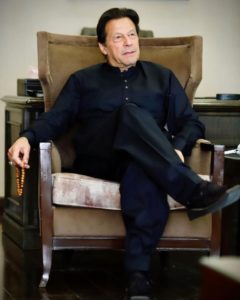
Imran Khan, a prominent figure in Pakistani politics, is the 22nd and current Prime Minister of Pakistan, assuming office in August 2018. Born in 1952 in Lahore, Pakistan, Khan initially gained fame as an international cricketer, leading the Pakistani cricket team to victory in the 1992 Cricket World Cup.
Following his retirement from cricket, Khan transitioned to politics, founding the Pakistan Tehreek-e-Insaf (PTI) party in 1996. Khan’s political platform centered on promises of anti-corruption, social justice, and good governance, resonating with a wide swath of disillusioned voters in Pakistan.
Khan’s political journey was marked by persistent challenges and setbacks. Despite emerging as a vocal critic of Pakistan’s political establishment and advocating for democratic reforms, Khan struggled to gain significant electoral traction in the early years of his political career.
However, Khan’s fortunes changed in the lead-up to the 2018 general elections, when the PTI secured a plurality of seats in the National Assembly, paving the way for Khan to become Prime Minister. His victory marked a historic moment in Pakistani politics, as the PTI formed the country’s first non-traditional government, breaking the dominance of the two main political parties, the Pakistan Muslim League-Nawaz (PML-N) and the Pakistan Peoples Party (PPP).
As Prime Minister, Khan has pursued an ambitious agenda focused on tackling corruption, reforming institutions, and revitalizing Pakistan’s economy. His government has implemented initiatives to promote social welfare, including the Ehsaas program aimed at poverty alleviation, and launched infrastructure projects to stimulate economic growth and create jobs.
Khan’s leadership, however, has been marked by controversy and criticism. His government has faced challenges on multiple fronts, including economic instability, diplomatic tensions with neighboring countries, and criticism over its handling of human rights issues and freedom of the press.
Despite these challenges, Khan remains a polarizing figure in Pakistani politics, admired by supporters for his commitment to reform and nationalism, while criticized by opponents for what they perceive as authoritarian tendencies and policy failures.
In summary, Imran Khan’s ascent to the highest office in Pakistan represents a remarkable political journey characterized by perseverance, ambition, and populist appeal. As he continues to navigate the complexities of governance and leadership, Khan’s legacy will be shaped by his ability to address the pressing challenges facing Pakistan while upholding the principles of democracy, transparency, and social justice.



